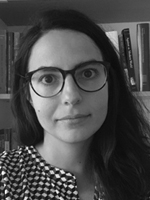Dr. Nur Yasemin Ural

Areas of Interest
- Islam in Europe
- Anthropology of the Secular
- Affect and Emotions
- Historical Sociology
Blasphemy and Freedom of Expression – Distinguishing Between Religious and Secular Injury
The question of moral injury caused by acts of blasphemy continues to divide the European public sphere. Since the Rushdie Affair in the UK and especially after the Charlie Hebdo assassinations in France, there has been recurrent public malaise regarding blasphemy in Western Europe. Both the legal definition of blasphemy, and its social significance as an ethical practice are still highly controversial subjects. Legal scholars and opponents of blasphemy laws argue that secular law can and should not protect either religion or religious entities such as God, Jesus Christ or Prophet Mohammed. They argue that the law can only protect persons who exist – physically and bureaucratically speaking. It cannot protect sacred, symbolic or non-human entities. This does not mean that there are no limits placed on freedom of expression. Some supporters of the right to blaspheme also argue that speech can and should be restricted when it constitutes clear incitement to racial and ethnic hatred that represents a danger to “public order, health and morals”. They argue that, while religion should not have a special status when it comes to moral injury, both the dignity of a religious person and public morals should be preserved. Drawing dividing lines between religion and race, or between an abstract religion and its followers is not easy, however. And it is also not easy to determine what constitutes ‘public morals’ and whose morals are taken into account.
This project will explore the distinctions made between ‘religious’ blasphemy and ‘secular’ hate speech. The way these two legal concepts are defined, the distinctions made between them, and the way in which the boundaries have shifted over time will provide insights into secularity in the societies in question. I propose a historical and sociological analysis of the current legal shift from protecting a religious institution and/or order (blasphemy against God or a divine figure) to protecting individuals (in this case, believing citizens). I will also analyse the associated debate regarding the right to blaspheme. I will argue that whether injury is conceived as racism, insult or critique of religion depends on a historical arrangement that deems certain subjects more prone to emotionality than others.
The comparative study will look at secularity in France and Germany. France abolished the blasphemy law in the Alsace-Moselle region in 2017 after Charlie Hebdo. Germany’s ‘blasphemy paragraph’ is still in effect though there is ongoing debate about it being replaced with hate speech laws. In both contexts the right to blaspheme has been the subject of vehement debate. By means of comparison, the project will seek to determine how ‘moral injury’ is understood in the two contexts.
The project proposes a combination of a textual and discursive analysis of historical blasphemy cases. I concentrate on a selected sample of legal cases or accusations of blasphemy starting from 1800, including famous cases such as the play Mahomet written by Henri de Bornier in 1889, or the painting of Jesus by George Grosz of 1928. The aim is to analyse the historical material of the period along with the legal and cultural conceptualisation of art and freedom of the artist. A contemporary media discourse analysis and qualitative study will trace the continuities and ruptures of attitudes towards blasphemy in both contexts.
I also plan to conduct semi-structured and focus group interviews, mainly with opponents of blasphemy laws, including legal experts, public figures, artists, and NGO members in both countries. Through the analysis of interviews, historical texts and legal cases, I hope to provide a detailed overview of the politics of hate speech regulations pertaining to religion in France and Germany today.
Biography
Research Associate, Collaborative Research Center Affective Societies, Freie Universität Berlin, Berlin (GER)
Visiting Research Fellow, Collaborative Research Center From Heterogeneities to Inequalities, Universität Bielefeld, Bielefeld (GER)
Ph.D. (Dr. Phil) Sociology, EHESS Paris, Paris (FRA)
Associated Doctoral Student, Centre Marc Bloch, Humboldt Universität zu Berlin, Berlin (GER)
Visiting Doctoral Student, Institute of Islamic Studies, Freie Universität Berlin, Berlin (GER)
M.A. Sociology, EHESS Paris, Paris (FRA)
B.A. Sociology, Boğaziçi Üniversitesi, Istanbul (TUR)
Relevant Publications
- Scheve, Christian v., Anna L. Berg, Meike Haken, and N. Y. Ural, eds. Affect and Emotion in Multi-Religious Secular Societies. London: Routledge, 2019.
- Scheve, Christian v., N. Y. Ural, A. Berg, and Meike Haken. “Freedom of Speech and Secular Affect in German Public Debates.” In Affect and Emotion in Multi-Religious Secular Societies. Edited by Christian v. Scheve et al. London: Routledge, 2019.
- Ural, N. Y., and Anna L. Berg. “From Religious Emotions to Affects: Historical and Theoretical Reflections on Injury to Feeling, Self and Religion.” Culture and Religion 20, no. 2 (2019): 207–23.
- Ural, N. Y., and Christian v. Scheve. “Affective Dynamics of Conflicts Between Religious Practice and Secular Self-Understanding: Insights from the Male Circumcision and ‘Burkini’ Debates.” In Emotions in Late Modernity. Edited by Roger Patulny, Alberto Bellocchi and Rebecca E. Olson., 2019.
- Ural, N. Y., Walter R. Jochum, and A. Berg. “Houellebecqs Soumission Und „Die Muslime“ Im Französischen Und Deutschen Diskurs Über Den Roman.” Tagungsband Diskurs – kontrastiv, 2016, 175–90.
- Ural, N. Y. “La Place Des Défunts Musulmans Dans Les Cimetières Français Et Allemands.” In European Public Islam. Edited by Göle Nilüfer and Yassine, Rachid, I., 313–38. Paris: Halfa, 2015.
- Ural, N. Y. “A Genealogy of Muslims Dying in France.” Sociology of Islam 2, 1-2 (2014): 1–20.
- Ural, N. Y. “La Mémoire Des Morts: Les Pratiques Des Choix Funéraires Des Minorités Originaires De Turquie En France Et En Allemagne.” New Cultural Frontiers, no. 3 (2012): 69–90.


